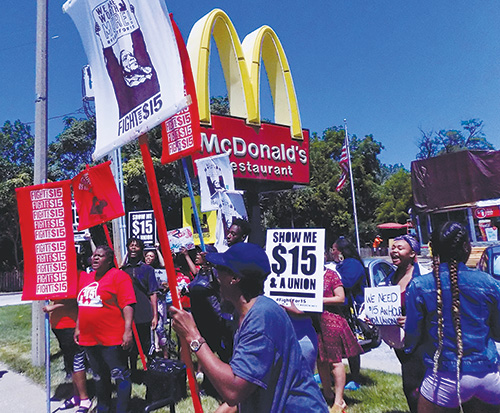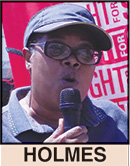By TIM ROWDEN
Editor

University City, MO – Activists with Show Me $15 gathered outside the McDonald’s at 8127 Olive Blvd. the day after the U.S. House of Representatives passed the Raise the Wage Act, to demand McDonald’s follow suit.
 “This vote shows us our politicians are hearing us and understanding that $15 is the minimum we need to get by,” said Frances Holmes, who works at the University City McDonald’s and has been active in the St. Louis area’s Show-Me-$15 movement. Holmes earns $9 an hour and says she struggles to pay her bills and put food on the table.
“This vote shows us our politicians are hearing us and understanding that $15 is the minimum we need to get by,” said Frances Holmes, who works at the University City McDonald’s and has been active in the St. Louis area’s Show-Me-$15 movement. Holmes earns $9 an hour and says she struggles to pay her bills and put food on the table.
“We will keep fighting until we get a living wage where we can provide for our families with our work,” she said.
The proposed Raise the Wage Act would gradually increase the minimum wage to $15 by 2025, automatically update it every year after that, and phase out the subminimum wage for tipped workers. The bill would more than double the federal minimum wage, which is $7.25 an hour — about $15,000 a year for someone working 40 hours a week, about $10,000 less than the federal poverty level for a family of four.
The federal minimum wage has not been raised since 2009, the longest time the country has gone without a minimum-wage increase since it was established 1938.
Adjusted for inflation, the minimum wage today is roughly 30 percent lower than it was in 1968.
POLITICAL ROADBLOCK
While activists celebrated last week’s vote, the Raise the Wage Act is unlikely to become law before the November 2020 election.
The House measure passed largely along party lines, 231-199, and faces a blockade in the Senate, where Majority Leader Mitch McConnell (R-Ky.) has said he will not take it up. Only three Republicans voted for it, and six Democrats opposed it. Most them representing swing districts.
A SEVEN-YEAR FIGHT
Since the Fight for $15 and a union began in 2012, more than 24 million workers have won $70 billion in raises, with more than 30 percent of U.S. workers on their way to a $15 minimum wage. But because McDonald’s has failed to act, many of the very workers who started the movement are still stuck with poverty level wages.
Which is why activists in St. Louis and nine other cities took to the streets Friday, chanting “We work! We sweat! We want $15 on our check!” letting lawmakers and corporations like McDonald’s know that a symbolic vote is not be enough, that they will continue fighting until they get a living wage and a union.
McDonald’s finally responded to worker protests earlier this year pledging to stop lobbying against a minimum wage increase, but the company has failed to address workers’ demands for $15 and union rights, even as other major employers like Target, Disney, Bank of America and even Amazon have lifted wages to $15.
“It’s been seven long years,” Holmes said. “Today, we are one step closer after the members of Congress voted to make $15-an-hour the federal minimum wage. I think if we push it fast enough and hard enough we’ll get it done. Now it’s time for McDonald’s to join us and support us be giving us that $15-an-hour and a union. Congress passed it yesterday, McDonald’s needs to pass it today.”
WOULD LIFT 1.3 MILLION OUT OF POVERTY
According to a recent Congressional Budget Office analysis, raising the minimum wage to $15 by 2025 would pull 1.3 million Americans out of poverty – nearly half of them children – and could result in wage increases for up to 33 million workers – 90 percent of them age 20 or older and 58 percent of whom are women – increasing their total annual wages by $92.5 billion, and boosting annual earnings for the average low wage year-round worker by $2,800.
McDonald’s workers in St. Louis were joined by workers in nine other cities, including: Los Angeles, San Jose, Detroit, Chicago, Kansas City, Mo., Memphis, Miami, Orlando and Durham, N.C.


